Term Page
Asylum Path Fragment
community 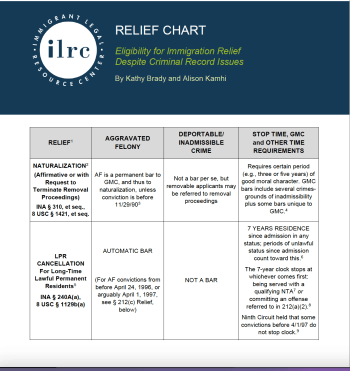
This Chart summarizes the criminal record bars to many forms of relief, to provide a quick way to check whether your client is potentially eligible for relief. See also ILRC, Immigration Relief Toolkit (2018).
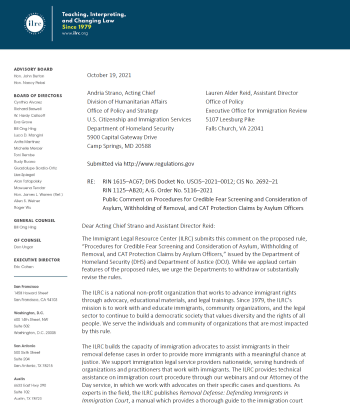
On October 19, 2021, the ILRC submitted comments raising concerns about USCIS’ proposed regulation changing the procedures for credible fear screenings and asylum. While the proposed regulation contains some provisions that would improve the current system, it also poses a significant risk to asylum seekers’ right to a full, fair and consistent hearing of their claims.
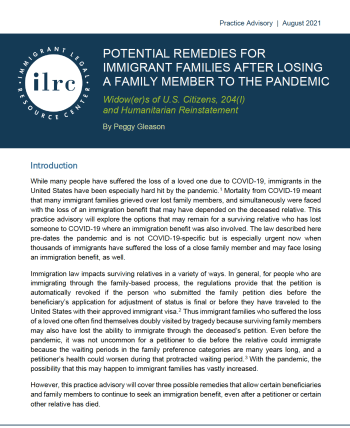
Mortality from COVID-19 meant that many immigrant families grieved over lost family members, and simultaneously were faced with the loss of an immigration benefit that may have depended on the deceased relative. This practice advisory will explore the options that may remain for a surviving relative who has lost someone to COVID-19 where an immigration benefit was also involved. The three possible remedies are: Survivor benefits for widow(er)s of U.S. citizens (USCs) under INA § 201(b)(2)(A)(i); other benefits for certain surviving relatives under INA § 204(l); and humanitarian reinstatement of an approved I-130 petition.
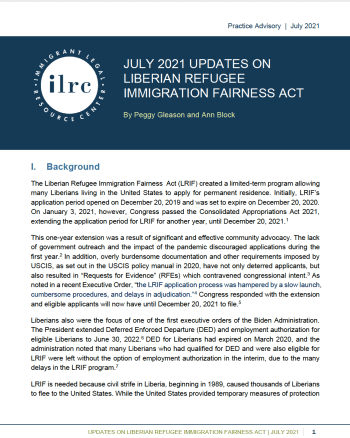
The Liberian Refugee Immigration Fairness Act (LRIF) created a limited-term program allowing many Liberians living in the United States to apply for permanent residence. Initially, LRIF’s application period opened on December 20, 2019 and was set to expire on December 20, 2020. On January 3, 2021, however, Congress passed the Consolidated Appropriations Act 2021, extending the application period for LRIF for another year, until December 20, 2021.

In July 2021, African Communities Together, the UndocuBlack Network, and the Immigrant Legal Resource Center submitted a memo to USCIS outlining the reasons that an expired Liberian passport should be considered primary evidence of nationality for LRIF eligibility.

Children and youth compose a significant portion of the U.S. immigrant population and often qualify for various forms of immigration relief, many of which involve an application filing fee. Under the Trump administration, USCIS promulgated a final rule intended to dramatically raise fees for many immigration application forms, including those available to young people, and would have limited access to fee waivers. The rule was blocked by federal courts, and after President Biden took office, the Department of Justice decided not to defend the rule, so it never took effect and for now immigration filing fees remain at the previously set amounts. This advisory reviews some of the main forms of immigration relief available to children and youth and the current fees for each, and summarizes the litigation and related efforts that ultimately defeated the Trump fee rule.

In April, the U.S. Citizenship and Immigration Services (USCIS) put out a request for public input regarding Identifying Barriers Across U.S. Citizenship and Immigration Services (USCIS) Benefits and Services. The ILRC has submitted these comments.
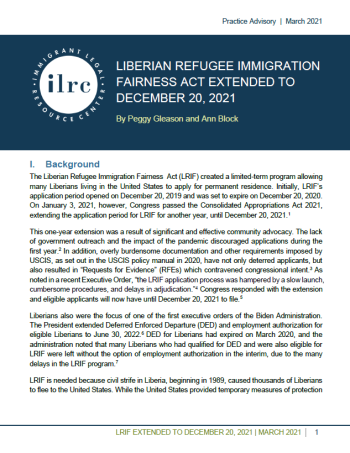
The Liberian Refugee Immigration Fairness Act (LRIF) created a limited-term program allowing many Liberians living in the United States to apply for permanent residence. Initially, LRIF’s application period opened on December 20, 2019 and was set to expire on December 20, 2020. On January 3, 2021, however, Congress passed the Consolidated Appropriations Act 2021, extending the application period for LRIF for another year, until December 20, 2021.
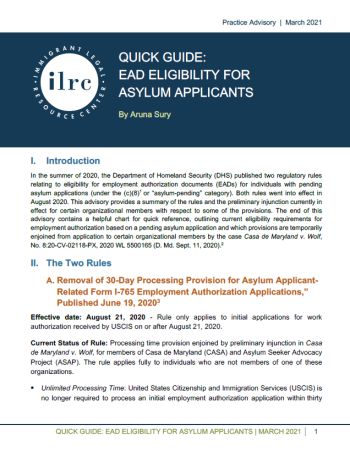
In the summer of 2020, the Department of Homeland Security (DHS) published two regulatory rules relating to eligibility for employment authorization documents (EADs) for individuals with pending asylum applications. Both rules went into effect in August 2020. This advisory provides a summary of the rules and the preliminary injunction currently in effect for members of Casa de Maryland (CASA) and Asylum Seeker Advocacy Project (ASAP). The end of this advisory contains a helpful chart for quick reference, outlining current eligibility requirements for an EAD based on a pending asylum application, and which provisions are temporarily enjoined by the case Casa de Maryland v. Wolf, No. 8:20-CV-02118-PX, 2020 WL 5500165 (D. Md. Sept. 11, 2020), for certain organizational members.

On March 16, 2021, ILRC and seven other coalition members of the Liberian Refugee Immigration Fairness (LRIF) Strategy Group submitted recommendations to the Administration and USCIS leadership for equitable implementation of LRIF. The group requested a meeting with the government to discuss these recommendations.